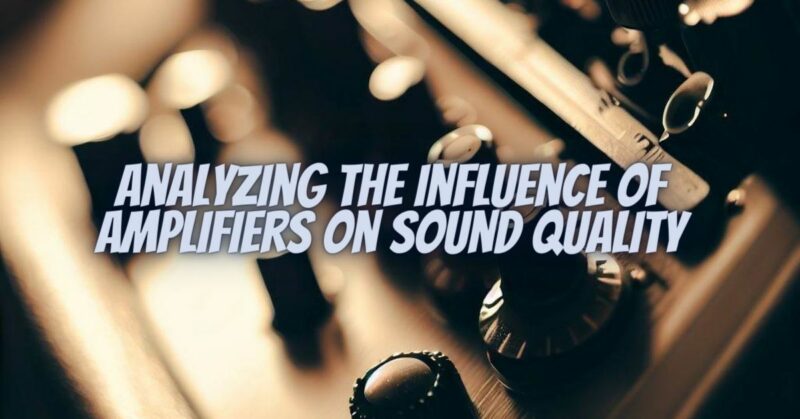Amplifiers are often the unsung heroes of the audio world, working silently behind the scenes to shape and amplify the audio signals that eventually reach our ears. Yet, their influence on sound quality is profound. In this comprehensive article, we’ll explore the intricate ways in which amplifiers impact sound quality across various audio systems.
Understanding the Role of Amplifiers
Before delving into the nuances of amplifier influence, let’s establish a fundamental understanding of what amplifiers do:
- Amplification: At its core, an amplifier takes a weak electrical audio signal and magnifies it to a level that can drive speakers or headphones. This process involves increasing the amplitude (volume) of the signal while preserving its fidelity.
- Signal Purity: High-quality amplifiers are designed to reproduce the audio signal as faithfully as possible. They aim to pass the signal through with minimal distortion, coloration, or added noise. This fidelity to the original signal is essential for audiophiles and discerning music enthusiasts.
- Power Delivery: Amplifiers provide the necessary power to move the diaphragms in speakers or the drivers in headphones. This power ensures that the audio is projected with the required intensity, especially for demanding and dynamic audio content.
The Multifaceted Impact of Amplifiers
Now that we have a foundational understanding, let’s delve into the multifaceted ways in which amplifiers influence sound quality:
1. Enhanced Clarity and Detail
One of the most immediate and discernible improvements that a quality amplifier brings is enhanced clarity and detail in audio reproduction. Every sonic nuance, from the gentle plucking of a guitar string to the subtle inflections in a vocalist’s delivery, becomes more distinct and lifelike. The level of detail offered by a superior amplifier allows for a richer and more immersive listening experience.
2. Preservation of Dynamics
Dynamics in audio refer to the differences in loudness between the softest and loudest parts of a recording. A high-quality amplifier can reproduce these dynamics faithfully, preserving the emotional impact of music or the realism of movie soundtracks. It ensures that the quietest whispers and the most thunderous crescendos are rendered with precision, making for a truly dynamic listening experience.
3. Accurate Tonality
Amplifiers play a pivotal role in maintaining the tonal balance of audio. A quality amplifier is designed to provide a flat frequency response, ensuring that bass, midrange, and treble frequencies are reproduced accurately. This precise tonality allows you to hear music and audio content as the artists and engineers intended, free from unwanted coloration or emphasis on certain frequencies.
4. Reduction of Distortion
One of the most critical advantages of a quality amplifier is the reduction of distortion. Distortion can manifest in various forms, such as harmonic distortion, intermodulation distortion, or transient distortion, and it can significantly degrade sound quality. A top-tier amplifier minimizes these distortions, resulting in cleaner, more transparent, and distortion-free audio.
5. Greater Headroom
Headroom is an amplifier’s capacity to handle transient peaks in the audio signal without clipping or distortion. A quality amplifier provides ample headroom, allowing you to play audio at higher volumes without degradation in sound quality. This is particularly crucial for music with sudden loud bursts or movies with explosive action sequences, where the amplifier can handle these dynamic peaks effortlessly.
6. Precise Volume Control
High-quality amplifiers offer precise volume control, allowing you to fine-tune the loudness to your liking. This precision ensures that you can enjoy audio at the exact volume level that suits your preferences without compromising sound quality. Whether you prefer a soft, background ambiance or a room-filling concert experience, a quality amplifier allows for precise control.
7. Compatibility and Versatility
Superior amplifiers are designed to work seamlessly with various audio sources, whether it’s a turntable, CD player, digital streaming device, or home theater system. They also accommodate different speaker and headphone types, making them versatile components that can adapt to your changing audio needs. This compatibility ensures that you can enjoy high-quality sound across your entire audio setup.
In conclusion, the influence of amplifiers on sound quality is multifaceted and profound. Amplifiers act as the bridge between audio sources and speakers or headphones, ensuring that the audio is faithfully reproduced with enhanced clarity, dynamics, tonal accuracy, reduced distortion, ample headroom, precise volume control, and versatility. Whether you’re an audiophile, a music enthusiast, or simply someone who values high-quality sound, investing in a superior amplifier is a step toward unlocking the full potential of your audio experience. It’s a testament to the vital role that amplifiers play in elevating our auditory world.


